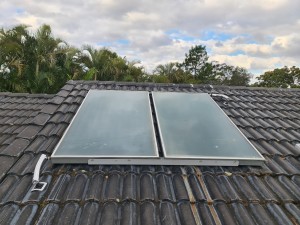What are they?
Solar hot water collectors, also known as solar thermal collectors are devices designed to capture and utilise energy from sunlight to heat water. They can be used for domestic and commercial applications and are a fundamental component of solar hot water heating systems. Solar hot water systems are environmentally friendly and energy-efficient alternatives to traditional water heating methods.
How do they work?
Solar hot water collectors are typically installed on rooftops away from shaded areas where they can receive direct sunlight. These collectors are manufactured using dark coloured, heat absorbing materials. The rays of the sun pass through the high-transmittance glass covers to heat the absorber plate. This process is highly efficient and even on cloudy days there is some level of solar energy transferred. In some areas prone to frost, antifreeze is used to transfer and circulate through the collector pipework. As the fluid passes through the collector, it absorbs the heat, causing its temperature to rise. Water is then circulated via pump or thermosiphon effect to the storage tank. In split system applications, a controller and temperature sensors are used to monitor the temperature of the water in the storage tank and collectors.
Benefits
- Renewable Energy Source: Solar hot water collectors use sunlight, which is a renewable and is a renewable and virtually limitless source of energy. This reduces reliance on finite fossil fuels and contributes to a more sustainable energy future.
- Reduced Carbon Emissions: Solar hot water systems produce no greenhouse gas emissions while generating heat and this helps combat climate change by reducing the carbon footprint associated with water heating.
- Energy and Cost Savings: As these systems use free solar energy, they can significantly reduce energy bills for heating water. Over time, the initial investment in a solar hot water system can pay for itself through reduced utility costs.
- Low Operating Costs: Solar hot water systems have relatively low maintenance costs, and sunlight is free furthermore, once installed, they require minimal upkeep compared to some other water heating methods.
- Energy Independence: During power outages, solar hot water systems can continue to operate as long as there is sunlight and can provide a degree of energy independence. This is particularly valuable during power outages or in remote areas where traditional energy sources may be unreliable or unavailable.
- Government Incentives: The Federal Government offers an STC (Small Scale Technology Certificates) for the installation of an energy efficient system. Other State Government rebates may apply, making them even more cost-effective. In addition to the STC Rebate, there is the Climate Smart Rebate.
- Long Lifespan: Solar hot water collectors are designed to be long lasting, providing reliable hot water for many years.
- Local Job Creation: The installation and maintenance of solar hot water systems can create local job opportunities, contributing to the growth of the renewable energy sector.
Maintenance
To ensure the operation and efficiency of your solar hot water system, regular maintenance is essential to maximise energy savings and a long lifespan. Here’s some steps you can take:
- Visual Inspection: Regularly check for signs of physical damage, like cracks or leaks in the collector panels, frames, or pipes. Inspect all connections, joints and valves for any signs of leaks. A small leak can lead to a significant loss of heat and efficiency so they should be promptly repaired. Check for any signs of wear or deterioration in seals and gaskets.
- Cleaning: Dust, dirt, debris and bird droppings can accumulate on the surface of the glass and reduce its efficiency. Regular cleaning will improve the collectors efficiency.
- Antifreeze Check: If your solar hot water system uses antifreeze as a heat transfer fluid, check its level and condition
- Monitor Performance: Keep track of the system’s performance over time. If you notice a significant drop in efficiency or heating capacity, it may indicate a problem that needs attention.
Damage
Solar hot water collectors can become damaged due to various factors including:
- Physical damage: Damage to the collector glass can be caused from impact such as hail, falling tree branches, or a cricket ball!
- Extreme temperatures: Rapid temperature changes, particularly during winter frost periods and during the freezing and thawing cycles can cause thermal stress and cracks in the copper pipework within the collector.
- Corrosion: Over extended periods, exposure to moisture and environmental factors can lead to corrosion of metal components, reducing their integrity.
- Manufacturing defects: Flaws in the design or construction of the collector can make it more susceptible to failure. Collectors are usually covered under a 5, 7 or 10 year manufacturers warranty depending on the manufacturer.
- Poor maintenance: Neglecting regular cleaning and maintenance can lead to reduced efficiency and potential damage.
- Age: Like any mechanical system, solar collectors can deteriorate over time, leading to eventual failure.
Typically, once the collector glass or copper pipework has been damaged, it is unlikely that a repair is possible and the complete collector will require replacement. Proper installation, maintenance, and protection from environmental factors can help prolong the life of solar collectors.
Overall, solar hot water collectors are an eco-friendly and cost effective choice for those looking to reduce their environmental impact and energy expenses while enjoying the benefits of renewable energy. For further information on solar hot water, contact King Solar Man on 0416 075 682 or Solar Hot Water Systems
